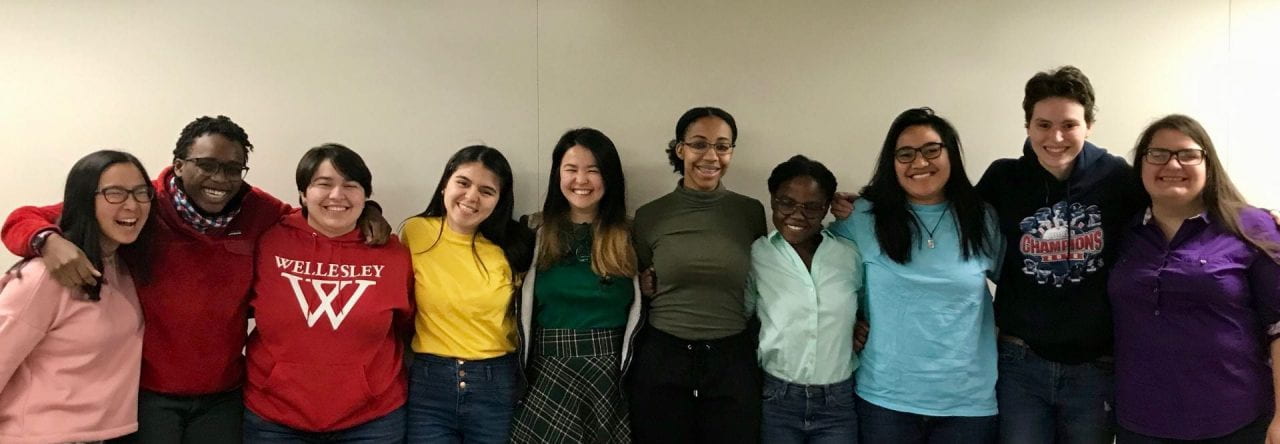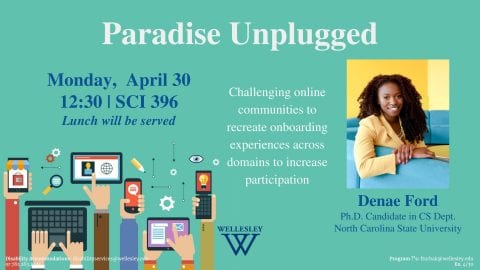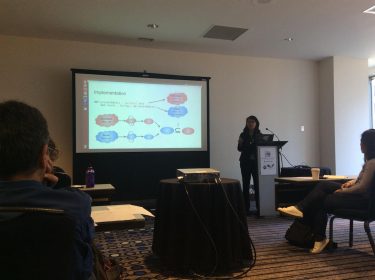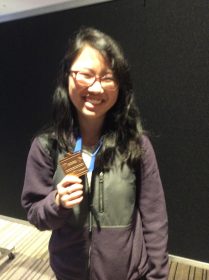On April 30, Denae Ford, PhD candidate in CS at NCSU, gave a talk titled Paradise Unplugged.
Author: Editor (Page 3 of 9)
Christine Bassem, Lecturer in Computer Science, has been awarded a National Science Foundation grant to study “Mobility Coordination of the Crowds in Mobile Crowd Sensing Platforms.” The grant of $154,434 will support Christine’s work with student researchers on the intersection of algorithms, systems, mobile computing, and social computing.
Coordinated mobility depends on two areas: the mechanisms via which tasks/routes are assigned to agents; and the mechanisms via which agents are compensated for conformance, creating a rich set of problems in the fields of optimization problems, graph and data mining, and crowd economics. This project contributes towards the advancement of mobile crowd sensing for solving larger problems, with a great impact on smart cities initiatives, and the advancement of Internet of Things solutions.
Valerie Zhao ’18 was recognized with an Honorable Mention in the 2018 Computing Research Association Outstanding Undergraduate Researcher Awards. Valerie’s summer research was previously featured here. Valerie is currently pursuing research on the design of dynamic binary instrumentation tools for analyzing software at the machine code level, advised by Ben Wood.
Valerie Zhao ’18 and Ben Wood participated in SPLASH 2017, the ACM SIGPLAN Conference on Systems, Programming Languages, Applications: Software for Humanity, in Vancouver, BC, in late October. SPLASH is an umbrella for several conferences and workshops in the area of programming languages.
Valerie won 3rd prize in the undergraduate category of the Student Research Competition, where she presented a poster and talk on her summer research work, Abstracting Resource Effects, undertaken at Carnegie Mellon University with Darya Melicher, Jonathan Aldrich, and Alex Potanin. Valerie’s collaborator Darya Melicher, a PhD student at CMU, presented more of their work at the OCAP workshop. Their work introduces a novel effect system that supports rigorous checking of how programs use system resources in a security-focused programming language.
Ben gave a talk on his OOPSLA paper, Instrumentation Bias for Dynamic Data Race Detection, with collaborators from Google, The Ohio State University, and the University of Washington. Their work introduced a software system for accurately detecting data races, a problematic type of concurrent programming error. The analysis helps eliminate a source of performance overhead in error detection by exploiting properties of common program patterns.
Earlier in October, Ben’s collaborator gave a talk on their paper, PARSNIP: Performant Architecture for Race Safety with No Impact on Precision, at the 50th ACM/IEEE Symposium on Microarchitecture (MICRO), in Cambridge. This work, with collaborators at U. Penn, designed efficient hardware support for data race detection that, combined with software techniques, could eventually provide always-on concurrency error detection much like modern memory-safe languages provide explicit runtime exceptions for null dereferences or array bounds errors.
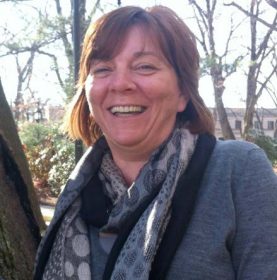 The CS department is excited to welcome Susan Lange as our new administrative assistant. Susan is splitting her time between keeping CS in motion and keeping the whole building in motion as Science Center Office Manager. Susan has been at Wellesley nearly 9 years, first in the Africana Studies department and more recently in the Provost’s Office. Stop by Susan’s desk in the minifocus to introduce yourself and welcome her!
The CS department is excited to welcome Susan Lange as our new administrative assistant. Susan is splitting her time between keeping CS in motion and keeping the whole building in motion as Science Center Office Manager. Susan has been at Wellesley nearly 9 years, first in the Africana Studies department and more recently in the Provost’s Office. Stop by Susan’s desk in the minifocus to introduce yourself and welcome her!
This Wellesley CS news blog aims to carry on the Wellesley CS Department’s newsletter series in a state-of-the-art turn-of-the-millennium format. Follow along for old news (since Winter 2016) and new news alike.
The Wellesley Daily Shot recently featured HoloMuse, a virtual reality museum application developed in the Wellesley HCI Lab with Orit Shaer.
Wellesley CS is delighted to welcome three new faculty members to the department for Fall 2017.
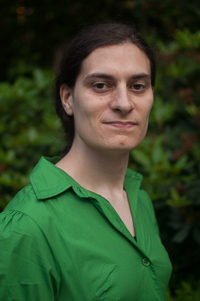 Assistant Professor Ada Lerner studies computer security and privacy, especially in interaction with social systems, the law, and human needs. They combine low-level measurement studies and systems building projects with high-level human subjects work in order to design and build tools that solve human problems, with an eye especially for needs of underprivileged groups. Ada’s recent work explored the security and privacy needs of journalists building and evaluating Confidante, a usable encrypted email system. Ada joins us from the University of Washington in Seattle, where they recently received their PhD. Ada is teaching CS 230 this fall. Come introduce yourself to Ada in SCI E120!
Assistant Professor Ada Lerner studies computer security and privacy, especially in interaction with social systems, the law, and human needs. They combine low-level measurement studies and systems building projects with high-level human subjects work in order to design and build tools that solve human problems, with an eye especially for needs of underprivileged groups. Ada’s recent work explored the security and privacy needs of journalists building and evaluating Confidante, a usable encrypted email system. Ada joins us from the University of Washington in Seattle, where they recently received their PhD. Ada is teaching CS 230 this fall. Come introduce yourself to Ada in SCI E120!
 Assistant Professor Catherine Grevet Delcourt ’09 prototypes social systems to study how people relate to each other through social technologies. She uses the lenses of human-computer interaction and social computing to develop novel prototyping methods for social systems research and to explore the role of social media in political polarization, identity and anonymity in online conversations, personal information management, and personal informatics. Catherine, a Wellesley alum, returns to join us via PhD work at Georgia Tech and research on social systems at Yik Yak. She is teaching CS 115 this fall. Stop by to meet Catherine in SCI E104!
Assistant Professor Catherine Grevet Delcourt ’09 prototypes social systems to study how people relate to each other through social technologies. She uses the lenses of human-computer interaction and social computing to develop novel prototyping methods for social systems research and to explore the role of social media in political polarization, identity and anonymity in online conversations, personal information management, and personal informatics. Catherine, a Wellesley alum, returns to join us via PhD work at Georgia Tech and research on social systems at Yik Yak. She is teaching CS 115 this fall. Stop by to meet Catherine in SCI E104!
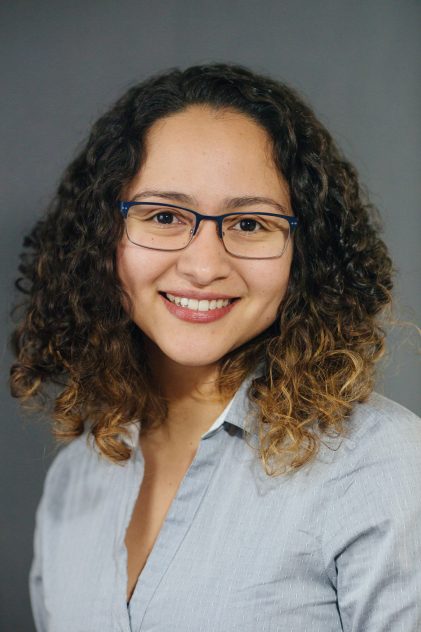 Hess Fellow Cibele Freire is a theoretical computer scientist whose research focuses on computational complexity and the theoretical foundations of databases. Her recent work has characterized several classes of database queries with respect to the notion of “resilience” — quantifying the minimal database changes required to cause a query to return different results. Cibele’s work has applications in efficiently updating database views and in explaining query results. Cibele joins us from the University of Massachusetts at Amherst, where she conducted her PhD work. She is teaching CS 235 this fall. Come meet Cibele in SCI S160!
Hess Fellow Cibele Freire is a theoretical computer scientist whose research focuses on computational complexity and the theoretical foundations of databases. Her recent work has characterized several classes of database queries with respect to the notion of “resilience” — quantifying the minimal database changes required to cause a query to return different results. Cibele’s work has applications in efficiently updating database views and in explaining query results. Cibele joins us from the University of Massachusetts at Amherst, where she conducted her PhD work. She is teaching CS 235 this fall. Come meet Cibele in SCI S160!
Please join us in extending a warm welcome to Ada, Catherine, and Cibele!
Eni Mustafaraj’s research on tracking and combating online misinformation was featured in the Wellesley Daily Shot: Why Are We Still Falling for “Fake News”?
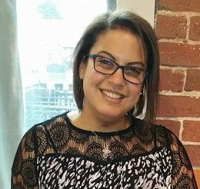 In April, Wellesley CS Lecturer Christine Bassem was selected in a highly competitive process as a member of the inaugural class of the new ACM Future of Computing Academy. Christine and fellow ACM-FCA members traveled to San Francisco in June to join Turing Award winners and others for the 50th anniversary of the ACM Turing Award. The ACM-FCA members will take a prominent role in shaping the future of the ACM and the broader computing field, building connections between academia and industry.
In April, Wellesley CS Lecturer Christine Bassem was selected in a highly competitive process as a member of the inaugural class of the new ACM Future of Computing Academy. Christine and fellow ACM-FCA members traveled to San Francisco in June to join Turing Award winners and others for the 50th anniversary of the ACM Turing Award. The ACM-FCA members will take a prominent role in shaping the future of the ACM and the broader computing field, building connections between academia and industry.
Congratulations to Christine on this well-earned honor!
